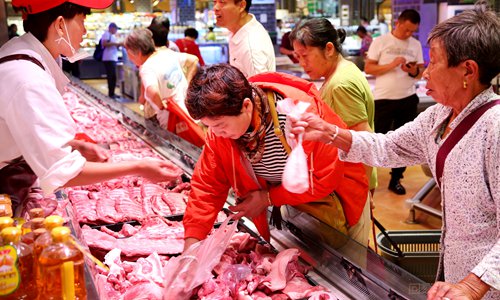HOME >> BUSINESS
Pork prices rising, but market reports show upward momentum weakening
Source:Global Times Published: 2019/8/26 20:41:27

Customers shop for pork in a supermarket in Lianyungang, East China's Jiangsu Province. Photo: IC
Due to the impact of African swine fever (ASF), pork prices in China are showing an upward trend, but market reports indicate that the momentum has weakened. Prices appear to be peaking with little further scope to rise.The average price of pork on Monday was 30.15 yuan ($4.22) per kilogram in Beijing's Xinfadi agricultural products wholesale market, up 7.7 percent week-on-week and 43.6 percent month-on-month.
The price was 31.4 yuan per kg in Jingyang, Northwest China's Shaanxi Province, up 9 percent week-on-week and 27.6 percent month-on-month.
According to the latest weekly report of the Xinfadi market, the latest price hike mainly reflected higher producer prices.
The report noted that slaughterhouses had an expected price of more than 27 yuan per kg, which was also the target price of their frozen pork inventory. Only when the price of fresh pork rose above 27 yuan per kg, could they start to put frozen pork on shelves.
The coming Mid-Autumn Festival and National Day Golden Week holidays could still be chances for slaughterhouses to push up prices, said the report, citing agents of those facilities.
However, experts said that the primary reason for higher prices was still tight supplies caused by ASF.
"Also, early autumn tends to be a peak season for pork consumption, which has triggered the latest round of price hikes," Wang Zuli, a research fellow with the Chinese Academy of Agricultural Sciences, told the Global Times on Monday.
Wang said that the herd of sows had started to increase, especially in the northeast and northwest provinces of China, including Liaoning, Jilin and Shaanxi.
"Pork production capacity is recovering," Wang said.
Posted in: ECONOMY